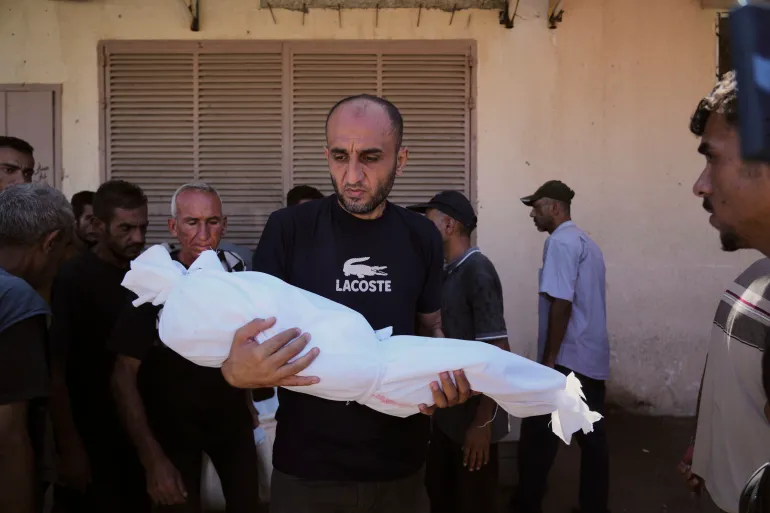
Israel dehumanized the Palestinians for decades, which led to the current genocide in Gaza, analysts say.
Commit a genocide – as a United Nations committee found that Israel did in Gaza – requires a force to try to exterminate another people. But to commit this level of violence, it is necessary to face those who are being killed as different from you, as inferior to humans. The population needs to be dehumanized.
This is the conclusion that Navi Pililary, head of the UN commission responsible for saying that Israel is committing a genocide, joining a growing list of organs that have come to the same conclusion.
“When I look at the facts of Rwanda genocide, it is very, very similar to that. You dehumanize your victims. They are animals and therefore, without awareness, you can kill them,” said Pillay, former assessment of the International Criminal Court.
For many observers in Israel, this process of dehumanization – where the value of Palestinian life is insignificant – has not begun with Israel’s war in Gaza, but dates back to the country’s short history and continues to influence the attitude of public and politicians today.
Genocidal war
Israel is currently bombing the city of Gaza, knowing that tens of thousands of Palestinian civilians remain there in a region where hunger was declared. The Israeli goal seems to be forcing civilians to leave so that the city – once the center of Palestinian life in Gaza – can be destroyed, facilitating the fight against Hamas and displaying some kind of victory to the Israeli public.
The suffering of the population of the city of Gaza is rarely considered in public statements by Israeli authorities. Bombarding the population to force them to move has become normal and even celebrated.
Israel’s Minister of Defense, Israel Katz, openly boasted that “Gaza is burning” – the city of Gaza, the place described by the United Nations Children’s Fund (UNICEF) as “the last refuge for families in the north of the Gaza Strip”.
However, the anguish of the Israeli population with the number of dead in Gaza and the actions of his army remains insignificant. Ancient state -of -the -art manifestations focused almost exclusively on requesting an agreement to ensure the return of the remaining Israeli prisoners in Gaza, rather than demanding the end of the massacre – more than 64,900 dead Palestinians – carried out on behalf of the population.
A survey released in mid -August by the Israeli Research Group Feard Center found that 76% of Israeli Jews interviewed totally or partially agreed with the suggestion that, among the remaining 2.2 million in the Gaza population before the war, no one was innocent.
“Genocide does not happen simply,” said Orly Noy, journalist and editor of Israeli magazine on local Hebrew Call, Al Jazeera. “A society does not become genocidal overnight. Conditions need to be gathered before that.”
“It’s systematic,” she said.
A history of dehumanization
The shock and fury with which Israel continues to see the attack led by Hamas on October 7, 2023-in which 1,139 people were killed-are the result of the ignorance of Palestinian life and the daily experience of living under occupation, said Yair Dvir, spokesman for the Israeli Organization of Human Rights B’tselem.
The attack, he told Al Jazeera, seemed to have come to “out of nowhere and without any apparent provocation. Israel was simply attacked by these ‘demons’.”
“People knew nothing about the decades of occupation that preceded it,” he said.
A displaced Palestinian woman sits with children amid devastated tents, after an Israeli attack during the night that rocked a building and damaged the temporary shelters around | Omar al-Qatta/AFP
In late July, B’TSelem, along with the Physicians for Human Rights-Israel, concluded that the War of Israel in Gaza was equivalent to genocide.
In its report, B’TSelem documented Israeli violations against Palestinians since Nakba, the ethnic cleaning of Palestine by Zionist militias in 1948, to pave the way for the state of Israel to the present. Throughout the report, the organization has described decades of policies intended exclusively to “consolidate the supremacy of the Jewish group throughout the territory under Israeli control.”
“You can spend years without even knowing a Palestinian. We have separate educational systems,” Dvir continued. “We don’t learn their language, their culture or anything about their history. Most people don’t even know about Nakba.”
“In Zionism and the educational system… it’s always the ‘other’. They are a threat,” he said.
“We even refer to them as ‘Israeli Arabs’, and when they answer, ‘No, we are Palestinians’, it’s like something shocking… It’s like they just said they support Hamas. We didn’t even allow their identity,” continued Dvir. “People often talk about the dehumanization of Palestinians when they are compared to animals, but that’s just the limit.”
Dehumanization systems
“It’s not just that Palestinians are the enemy; they are seen exclusively by a colonial look,” said Noy. “They are the natives, to be treated with contempt. They are somehow useless and inferior by birth.”
“This is a fundamental notion for Israeli society; this feeling that Palestinian lives are worth less,” said Noy.
 Children hold empty pots while waiting in line to receive food distributed by a charity in the nose -colored refugee camp | FADEL AA ALMAGHARI/ANADOLI AGENCY
Children hold empty pots while waiting in line to receive food distributed by a charity in the nose -colored refugee camp | FADEL AA ALMAGHARI/ANADOLI AGENCY
Already in 1967, Israeli authorities, including David Hacohen, then ambassador in Myanmar (Burma), were documented by denying that the Palestinians were even humans. In 1985, an analysis of hundreds of Hebrew children’s books revealed dozens portraying Palestinians such as “war lovers, tortuous monsters, bloodthirsty dogs, predator wolves or vipers”.
Two decades later, a survey showed that one in 10 Israeli children, when requested to draw Palestinians, portrayed them as animals – the same generation that is now part of the army in Gaza.
The instinct of dehumanizing the Palestinians to the point of making their massacre acceptable has always been present among Israel’s row right line, said Israeli analyst Nimrod Flaschenberg of Berlin. However, it was the withdrawal of Gaza’s settlements in 2005 that mobilized them to act in response to what they saw as the growing liberalism that took over the Israeli society.
 A Palestinian woman cries while carries the body of a baby dead in Israeli attacks in the city of Gaza at dawn, before a funeral procession in front of Al-Shifa Hospital on September 4, 2025 | Omar al-Qattaa/AFP
A Palestinian woman cries while carries the body of a baby dead in Israeli attacks in the city of Gaza at dawn, before a funeral procession in front of Al-Shifa Hospital on September 4, 2025 | Omar al-Qattaa/AFP
Undertaking the self -adenominated “march for institutions,” Flaschenberg described the deliberate campaign of settlers groups and their allies from the religious right to take control of the institutions that govern Israeli life, such as bureaucratic, educational, media and even military institutions, to ensure that their opinions became the norm.
“This system of beliefs continues today,” said Flaschenberg.
The attitude is deep
“The difference between fascists, as [o ministro da Segurança Nacional de extrema direita Itamar] Ben-Gvir and those who imagine themselves from the liberal center is very thin, ”said Israeli sociologist Yehouda Shenhav-Shahrabani.
He continued to refer to the recent example of comments from Israel’s former intelligence chief, Aharon Haliva, a man who, according to Shenhav-Shahrabani, most Israelis would consider a liberal, but was recorded that 50 Palestinians should be killed for each lost Israeli life on October 7, and “no matter if they are children.”
“They need a Nakba from time to time to feel the price,” he added.
 “They need a Nakba from time to time,” said Israel’s former intelligence chief, Aharon Haliva | Screen Capture/Reuters
“They need a Nakba from time to time,” said Israel’s former intelligence chief, Aharon Haliva | Screen Capture/Reuters
The attitude of the Israelis towards the Palestinians is deep, said Shenhav-Shahrabani, describing a process that goes back to the creation of the Israeli state, the first British descriptions of Palestine as a “land without people”, portraying the inhabitants of the region as a kind of indolent mass, without a traditional political center with which one could negotiate.
This attitude towards Palestinians – such as an entity disconnected from Earth or Home – was adopted by Israel and continues in current discussions that take place within Israel on how Gaza and, ultimately, occupied Sommonium could be ethnically clean.
“The notion that the Palestinian presence was temporary always existed, is ‘telos’ [inevitável]”, Disse shenhav-shahrabani.
“It is common for people to ask why they didn’t ‘end work’ in 1948 or 1967 in the war that led to the current occupation of Palestinian territory,” he said. “People see the displacement of Palestinians as inevitable. We talk about Nakba as an event, but it’s a process. It’s a continuous event. It’s now happening in West Bank and Gaza.”
Originally published by Al Jazeera on 9/17/2025
By Simon Speakman Cordall
Source: https://www.ocafezinho.com/2025/09/17/desumanizacao-como-israel-e-capaz-de-cometer-seu-genocidio-em-gaza/

